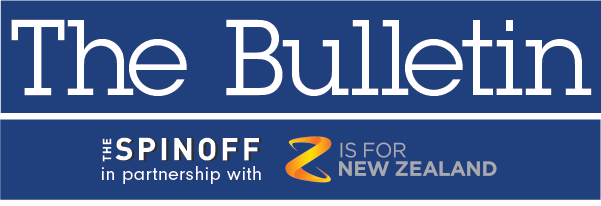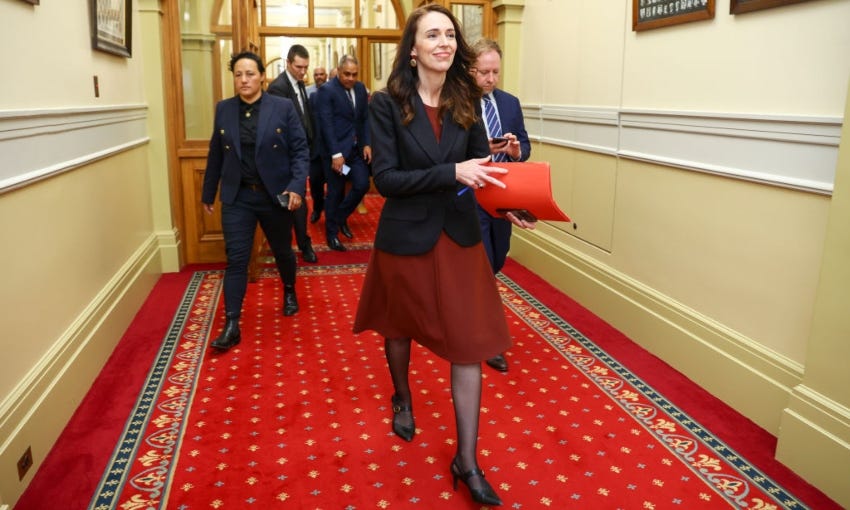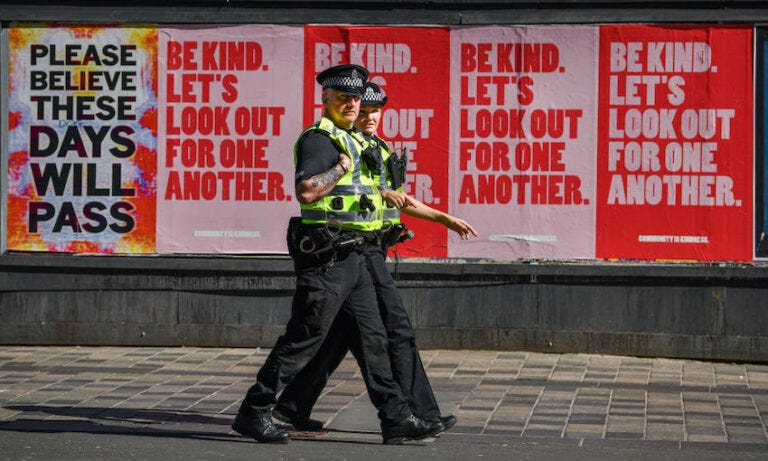Plenty of surprises in new Ardernistration
There were some major surprises, shuffles, promotions and demotions
Good morning and welcome to The Bulletin for Tuesday 3 November, by Alex Braae for The Spinoff. Presented in partnership with Z Energy.
In today’s edition: Who’s up and who’s down in Ardern’s new cabinet, new Covid-19 community case in Christchurch, and Ngāi Tahu taking Crown to court over freshwater.
Image: Jacinda Ardern heading into the caucus meeting yesterday (Getty Images)
Throw out all those articles you read predicting who would get what ministerial jobs – they were pretty much all wrong on some big calls. PM Jacinda Ardern has unveiled who will be taking what roles for the next government, and there are some major surprises, shuffles, promotions and demotions. You can read a full list of who's inside the new cabinet (and holding ministerial warrants outside cabinet) on our live updates, but a few highlights:
There has been a big change in how health is managed. As Justin Giovannetti reports, the new cabinet has been built with tackling the multi-faceted fallout of Covid-19 in mind. The new minister will be Andrew Little (who saw that coming?) while incumbent Chris Hipkins will take over a new portfolio covering Covid-19. Stuff reports one of Little's major jobs will be overseeing the review and potential restructure of the DHB system, a massive long term project. Public health expert Dr Ayesha Verrall will also slot into cabinet as associate health minister, the only first term MP to be put in. Peeni Henare will retain the associate portfolio, with responsibility for Māori health.
That segues into one of the more notable aspects of the new look cabinet – an increase in the latitude of roles for Māori ministers. As commentator Shane Te Pou writes on The Spinoff, "no longer are Māori only given Māori-specific roles. Māori are at the table, in numbers, in every major policy area including education, health, and housing." Nanaia Mahuta will become the country's first ever female foreign minister, while Peeni Henare, Willie Jackson and Kiri Allan have all been promoted to cabinet. Henare will take on defence, while Allan gets conservation and emergency management. Kelvin Davis will not be the deputy PM, but will remain deputy leader, while holding onto corrections and picking up minister for children.
There are a few telling selections in the mix. Finance minister Grant Robertson (who will be deputy PM too) picks up the infrastructure portfolio, suggesting some projects are about to get a lot more focused attention. The Auckland Chamber of Commerce absolutely loves the change, putting out a release describing it as "a new improved, coordinated senior economic team". Every portfolio that relates to the justice sector is held by a non-Pākehā minister, with Poto Williams taking police, Kris Faafoi taking justice itself, Aupito William Sio becoming minister for courts, and Willie Jackson picking up associate justice. David Parker adds oceans and fisheries to his environment portfolio, suggesting a bigger focus on that aspect.
The cabinet lineup also offered a glimpse of how some ministers who buggered things up last time might come back. Phil Twyford has been demoted heavily, falling out of cabinet but holding onto a few portfolios. David Clark has been returned to cabinet, with portfolios that offer at least the glimpse of one day returning to the sorts of finance portfolios he's reportedly most interested in. And Meka Whaitiri, who was bundled from cabinet for allegedly hurting a staff member, will be minister outside cabinet for customs and veterans.
So everyone's a winner? Not really – as two of Stuff's gallery team write, there could be several people disappointed, for either overt or subtle reasons. Jenny Salesa is gone from the executive altogether, and will only be an assistant speaker, while David Parker hasn't necessarily had the sort of rise that he could have. Kieran McAnulty will become chief whip, a big job for sure, but not the ministerial portfolio that many speculated was on the way.
And how will it all work? Writing on the NZ Herald (paywalled) political editor Audrey Young says some of the moves showed a boldness and ruthlessness relatively new for Ardern. But Young also foresees a bit of messiness in health, with quite a bit of split responsibility.
Also in our live updates: One new community case of Covid-19 has been detected – a staff member working in a managed isolation facility in Christchurch where the international mariners are in managed isolation and quarantine. The person was picked up through routine testing, and as recently as October 29 returned a negative test, but subsequently developed symptoms – they did the right thing and self-isolated as soon as those symptoms started. Full case details will be provided at the 1pm update.
Ngāi Tahu is taking the Crown to court, in an effort to gain rangatiratanga over freshwater within its area, reports Stuff's Joel Maxwell. The story unpacks what exactly is meant by that term – it's more like shared authority being sought, rather than full control or ownership. The iwi says they have previously tried to engage with the Crown on water issues, but been unsuccessful, despite rangatiratanga principles being part of their treaty settlement with the Crown.
Auckland is likely to face a horribly humid summer, which will be devastating news to those of us who are more suited to temperate climates. The NZ Herald's (paywalled) Jamie Morton has crunched the data, with a combination of a strong La Nina system and the increasing impacts of climate change on the way. The latter point will make it worse than the last such system in the summer of 2011/12.
I missed this one yesterday, but Air NZ has been told to temporarily freeze new bookings amid a surge in demand for managed isolation facilities. Stuff's John Anthony reports it is partly because of a rush of people coming back ahead of Christmas, and by the end of next week it is estimated that the MIQ system will be basically full. Previously the system had a period of not meeting capacity. It follows a similar freeze put on in July, with New Zealanders coming home to escape worsening situations overseas.
Criticisms are being raised about unregulated funeral directors leaving families traumatised by bad experiences, reports Kate Nicol-Williams for One News. Several came forward for the story, saying their loved ones were not treated with the care and respect they should have been. Industry group the Funeral Directors Association say the incidents are the result of new operators being motivated by the business opportunities in the sector, with high demand at the moment.
Got some feedback about The Bulletin, or anything in the news?
Drop us a line at thebulletin@thespinoff.co.nz
Right now on The Spinoff: Matt Fitzpatrick writes about the social and health consequences of the second wave of Covid-19 hitting Europe. Former United States ambassador to New Zealand David Huebner writes about why the American election matters to the whole world. James Borrowdale learns the stories behind the images nominated for the New Zealand Geographic Photographer of the Year. Luke Fitzmaurice writes about the ongoing Oranga Tamariki inquiry, and the question going forward of who should hold power over the system. Russell Brown writes about the mistaken assumptions around what cybercrime typically looks like. Alice Webb-Liddall writes about how much better her life has got since quitting social media. Sam Brooks marks the return of The Mandalorian, and writes about how it shows Star Wars' future is in TV, not the movies. And Stewart Sowman-Lund and Tara Ward combine powers to review the best and worst adaptations of UK shows to NZ.
For a feature today, a few pieces that look at aspects of the Auckland Super City, which is now ten years old. It hasn't necessarily been popular, particularly with people on the outer periphery of the region. As this report from Jean Bell at Radio NZ noted, there's still some unhappiness around the Franklin area, which originally opposed the creation of the Super City. Former district mayor Mark Ball said his area often gets passed over for the CBD. "Elected members all love to build the shiny things, they love to have the Aotea Squares and go to the opening of this and that, but nobody ever wants to bury pipes."
Fair shares of funding is also a concern in South Auckland, as per this piece from local democracy reporter Stephen Forbes. Complaints are aired that major events like the America's Cup don't end up benefitting people out south who are struggling, and the needs of the people there are very different. The argument was also raised that the old Manukau Council was closer to understanding that than the new Auckland Council.
And yet, it probably had to happen all the same, or at least something like it had to be done. Stuff's Todd Niall has looked back at the previous situation, with endless bickering between councils, and an inability to tackle regional problems. The Unitary Plan, for example would never have been possible pre-amalgamation, and nor would the sorts of housing and transport projects that might one day bring Auckland into the 21st century.
Noeline Taurua has her sights firmly set on a possible series against Australia. Stuff reports the Silver Ferns coach is keen to get something in place as early as possible, perhaps in January next year, after New Zealand swept England aside in their three-match series. While the Ferns are the reigning world champions, Australia is still ranked number 1 in the world, so it would be a real clash of the titans. The last series between the two nations was drawn 2-2.
That's it for The Bulletin. If you want to support the work we do at The Spinoff, please check out our membership programme







